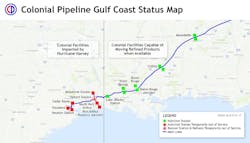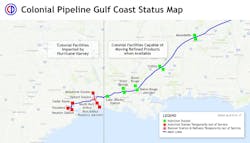Harvey: US SPR makes emergency release; Colonial Pipeline segment shut
As personnel attempt to move in on upstream, downstream, and midstream sites along the US Gulf Coast to assess possible damage following passage of Hurricane and Tropical Storm Harvey, the US government will send oil to the region’s beleaguered refining segment and a major fuel pipeline system will try to restart a portion of its operations.
The US Department of Energy said it is releasing 500,000 bbl of crude from the Strategic Petroleum Reserve’s West Hackberry site in Louisiana to Phillips 66’s 249,000-b/d Lake Charles refinery. The SPR holds 678.9 million bbl of crude, enough to supply the US for 33 days.
The release consists of 200,000 bbl of sweet crude and 300,000 bbl of sour crude. DOE said it “will continue to provide assistance as deemed necessary and will continue to review incoming requests for SPR crude oil.”
Including West Hackberry, all four of DOE's SPR sites, which are situated along the Gulf Coast, have commercial power capability and are drawdown-ready. The other three sites are Bayou Choctaw in Louisiana and Bryan Mound and Big Hill in Texas.
The US since Hurricane Sandy in 2012 also has a Northeast Gasoline Supply Reserve that holds 1 million bbl of gasoline, immediately supply of which has been constrained this week due to the widespread refinery shutdowns.
Colonial Pipeline Co., operator of the main fuel supply link between Gulf Coast refineries and the East Coast, said its system's Lines 1 and 2 are down from Houston to the Hebert injection station near the Texas-Louisiana border.
The lines were shut Aug. 30-31 due to supply constraints caused by the refinery shutdowns as well as the impact to Colonial’s facilities west of Lake Charles. Line 2 transports primarily diesel and aviation fuels. Line 1, which was previously operating at reduced rates, moves gasoline.
Colonial expects to return to service from Houston on Sept. 3 following an evaluation of its infrastructure and successful execution of its startup plan. Meanwhile, Lines 1 and 2 continue to operate from Lake Charles east, and deliveries will be intermittent and dependent on terminal and refinery supply, the company said.
Of the 26 refineries that connect to the Colonial system, 13 are between Houston and Lake Charles.
“Colonial is one part of the fuel delivery system, and there are multiple means of supplying the market to mitigate concerns with supply, including other pipelines, trucks, and barges,” the company said on Aug. 30.
DOE nonetheless notes that currently gasoline stocks in the Southeast are at or above the historic 5-year range.
Refineries begin restarting, tankers wait for offload
As of 6:00 a.m. CDT on Aug. 31, six refineries in the Gulf Coast region had begun the process of restarting, which may take a several days or weeks depending whether they have been damaged. The six refineries have a combined capacity of 1.27 million b/d, or 13.1% of total Gulf Coast (PADD 3) refining capacity and 4.2% of total US refining capacity.
Ten refineries remained shut down, according to public reports. That includes Motiva Enterprises LLC’s 600,000-b/d Port Arthur, Tex., refinery, the largest in the US (OGJ Online, Aug. 31, 2017). The 10 refineries have a combined refining capacity of 3.08 million b/d, or 31.7% of total Gulf Coast (PADD 3) refining capacity and 16.6% of total US refining capacity.
Two refineries in the Gulf Coast region were operating at reduced rates. The refineries have a combined capacity of 688,776 b/d, or 7.1% of total Gulf Coast (PADD 3) refining capacity.
As of Aug. 29, 25 oil-carrying vessels are waiting off Texas ports of Corpus Christi, Freeport, Texas City, Houston, and Galveston, as well as off Sabine Pass and Lake Charles, La., DOE reported. There were 22 vessels backed up on Aug. 28.
The Port of Corpus Christi has opened its inner harbor to barge traffic. The port continues to assess damage and is working to restore normal operations by Sept. 4. The Port of Houston is open with restrictions. The upper Houston Ship Channel from Morgan’s Point inbound to the Turning Basin remains closed for vessel traffic until weather conditions improve.
The ports of Freeport, Galveston, and Texas City are open with restrictions as they recover. The ports of Beaumont, Port Arthur, Lake Charles, and Sabine Pass remain closed.
Several rail lines have reported disruptions, DOE said. Rail is critical for the delivery of ethanol to petroleum product terminals for gasoline blending and for the movement of refinery byproducts, including propane, butanes, and sulfur out of refineries.
On Aug. 25, Kansas City Southern Railway declared force majeure and an embargo on shipments through Laredo and Brownsville-Matamoros going to Houston and Corpus Christi. On Aug. 28, KC Southern declared force majeure and an embargo on the remainder of its network in Texas affected by Harvey.
As of Aug. 30, Union Pacific said sections of its track were out of service in 18 of its 28 Houston-area subdivisions, and it was sending traffic along alternate routes through Longview and Dallas. UP was using helicopters and drones to inspect track and facilities in the affected areas.
Its workers were reorganizing major rail yards at Settegast, near downtown Houston, and Englewood, including assessing infrastructure, getting trains reassembled and cars back in the yard. Parts of UP’s Englewood Yard were flooded as of late Aug. 29.
BNSF said on Aug. 29 that normal train flows in the area were unlikely to resume for “an extended period.” CSX Corp. said on Aug. 30 that it was closely watching weather conditions in Louisiana and the southwestern portion of its operating network.
Chemical capacity still limited
As of the evening of Aug. 30, more than 50% of US ethylene capacity remained offline, with two more complexes shutting down in the Beaumont-Port Arthur-Orange area in Texas, S&P Global Platts reported.
Chevron Phillips Chemical Co. LLC has shut its complex at Port Arthur, including its 830,000-tonne/year cracker as well as propylene production.
E.I. DuPont de Nemours & Co. shut its 680,000-tpy cracker in Orange overnight due to expected power disruptions. DuPont had put the plant on standby, stopping production without fully shutting it down, ahead of Harvey's move toward southeast Texas from Houston, S&P Global Platts said.
BASF SE and Total SA were operating their 1 million-tpy cracker and other units in Port Arthur at reduced rates, a spokesman told the commodity and energy information services firm. Crews were ready to shut the complex if access to feedstocks and electricity became more constrained.
Formosa Plastics Corp.'s steam crackers at Point Comfort, Tex., remained shut nearly a week after ramping down ahead of Harvey's landfall, a company spokesman told the firm. The complex is anchored by two steam crackers with a combined estimated capacity of 1.5 million tpy.
Dow Chemical's petrochemical complexes in Freeport and in Louisiana remained operational, but plants may have to cut rates because logistics to move products are largely shut, a company spokesman told S&P Global Platts.
Mexichem SAB de CV said its joint-venture steam cracker with Occidental Chemical Corp. at Ingleside, Tex., is in good condition. The 550,000-tpy ethylene cracker was shut ahead of Harvey's landfall late Aug. 25. No restart date was provided to S&P Global Platts.
Offshore output slowly being restored
US Gulf of Mexico upstream operators are reboarding platforms and rigs to assess their ability to resume normal operations.
The US Bureau of Safety and Environmental Enforcement reported that, as of midday Aug. 31, 13.49% of crude oil production in the US gulf, or 236,115 b/d, remained shut. That’s down from 18.5% reported on Aug. 30 and an event high of about 25% late last week.
BSEE also estimates that 17.64% of US gulf natural gas production, or 568.09 MMcfd, remained shut. That’s down from 18.98% on Aug. 30 and a peak of about 25% late last week.
A total of 94 production platforms in the US gulf remained evacuated, representing 12.75% of the previous 737 manned platforms in the region.
Personnel were still evacuated from five nondynamically positioned rigs, a level unchanged since Aug. 26. It represented half of the rigs of this type previously operating in the US gulf.
Contact Matt Zborowski at [email protected].

